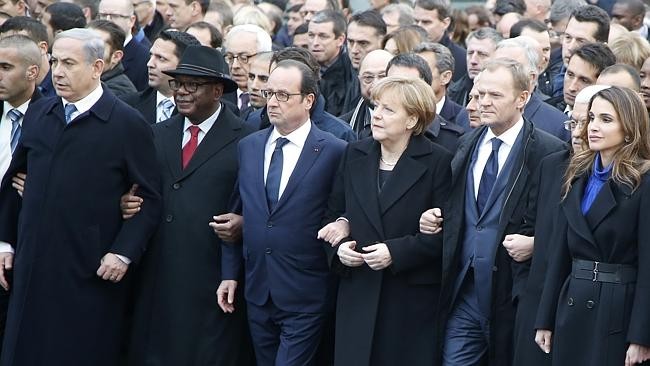(VOVworld) – Terrorism has cast a shadow over France, the EU, and several other countries after last week’s terrorist attacks in Paris killed 17 people. The massacres have pushed European countries closer to each other in the fight against terrorism. EU security officials said the terror spree in France was just the beginning.
 |
| World leaders converged on Paris in a rally of defiance and sorrow to honour the 17 victims of terror spree in France. (photo: AP/Michel Euler) |
People have marched in cities across Europe to show unity with the French people. EU countries have tightened security to prevent further attacks and launched special emergency security plans.
EU countries are on alert
The terror attacks in Paris have exposed security loopholes in France and other EU countries. Unity and cooperation among EU countries in recent days show that EU leaders are aware that killing sprees could occur in their own country.
British Prime Minister David Cameron urged British police and security forces to be prepared for terror attacks on multiple targets. He ordered the police and army to co-operate closely to ensure that the police can call in appropriate military assistance if required. He also promised to give British intelligence greater authorization to follow and monitor terror suspects in the UK.
French Prime Minister Manuel Valls said France’s anti-terrorism plan will be implemented at the highest level. France will deploy a large number of soldiers to protect newspaper offices, state agencies, Jewish synagogues, mosques, and religious schools which can be potential targets for terrorists.
German Chancellor Angela Merkel has asked all foreign intelligence agencies to cooperate in exchanging information globally. She said Germany has adjusted its security system to deal with the situation, increasing investment in security and the federal police. The German Ministry of Justice will submit a new bill to the cabinet in January in which even the attempt to travel to a terrorist training camp and the funding of terrorist groups would be punishable offence.
Italy has also raised a terrorist alert. Prime Minister Matteo Renzi proposed the establishment of an EU intelligence agency, saying that in addition to a common currency, the EU must also have a common security and intelligence system. Europe must be united against terrorism, he said.
Challenges
The terror attacks in France have pushed EU countries to a plan of action to combat terrorism. But the war on terror is not the responsibity of an individual country or part of a security operation.
Director of the European police agency, Europol, said on Tuesday that some 5,000 European Union citizens have joined jihadist militant groups. The Europol chief said these individuals, mostly young men, pose a threat to their country of origin if they return there.
Gilles de Kerchove, EU Counter-terrorism Coordinator, said there is no way to totally prevent more such terrorist attacks. The right way is certainly not to arrest all foreign fighters who returned to the EU from Syria or Iraq, because prison is just a huge incubator of radicalization.
The EU is aware that the tactics of extremists have changed to separate attacks targeting civilians. The fight against terrorism must adopt a broader approach, which should include respecting the right to self-determination of Arab nations, and assisting Middle East countries in economic development, poverty reduction, and job generation for young people. These measures would make it harder for jihadist groups to recruit new members.